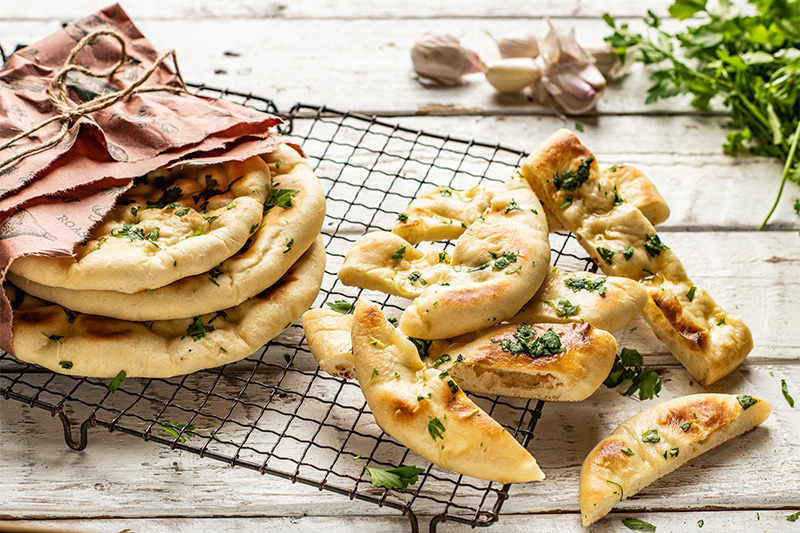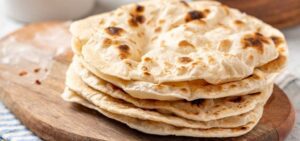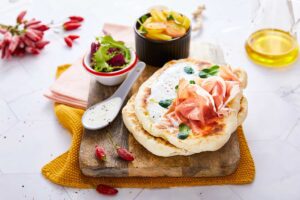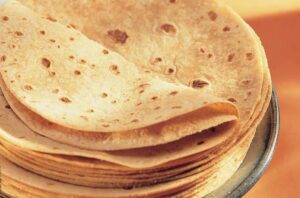Roti vs Naan
Indian cuisine is known for its variety of flavors, spices, and textures, with roti playing an integral role in its culinary tradition. Among the most popular options are roti and naan — two staples that are often found on Indian dining tables. While both are flatbreads, they differ significantly in ingredients, preparation methods, and the way they pair with dishes.
From the humble and healthy roti to the delicious and savoury naan, each has its own appealing and culinary purpose. Let’s explore the key differences between these two popular breads and discover how to best enjoy them with your favourite foods.

Paratha
What is Paratha?
Paratha is a traditional Indian flatbread made by folding and stacking dough, rolling it out, and cooking it on a hot griddle with oil or ghee (clarified butter). The result is a shiny, crispy bread with a golden brown texture that pairs perfectly with a variety of dishes.
Types of Paratha:
Plain Paratha: This is a simple version, made without any filling, and is often served with curries or dal.
Stuffed Paratha: Parathas can be stuffed with a variety of ingredients, turning them into a meal in themselves. Popular options include spiced potatoes (Aloo Paratha), radishes (Mooli Paratha), and cheese (Paneer Paratha).
Paneer Paratha
Paneer Paratha is a delicious stuffed paratha made by mixing grated paneer (Indian cottage cheese) with spices, green chilies, and coriander. It is a great snack option or a comfort food throughout the day.
How is it made?
Prepare the dough
Mix whole wheat flour with water, knead it into a soft dough, and let it rest.
Make the filling
Mix the grated paneer with spices like cumin, red chili powder, and garam masala.
Assemble
Roll out small portions of the dough, place the paneer filling in the center, fold the edges, and flatten it again.
Bake
Brush the paratha with ghee on a pan and cook until golden and crispy. Paneer paratha pairs beautifully with yogurt, pickles, or a dollop of butter.

Lachha paratha
Lachha paratha is another variation of paratha, known for its distinct layers and crispy texture. The word lachha means “ring” or “coil,” reflecting its unique spiral design.
What makes it special?
The layers in lachha paratha are achieved by folding and rolling the dough several times before baking. As the layers puff up during cooking, they create a delicious texture that is crispy on the outside and soft on the inside.
Best served with:
Lachcha paratha is often served with a rich curry such as butter chicken, paneer tikka masala, or dal makanani.

Roti
What is roti?
Roti, also known as chapati, is a simple, unleavened bread made from whole wheat flour. It is an everyday food in Indian households and is usually cooked until it is slightly puffed.
Why is roti popular?
Roti is light, healthy, and versatile. It pairs well with almost all Indian dishes, from vegetables to lentils and meat.
Pro tip
For an extra soft texture, knead the dough well and let it rest before rolling it out.
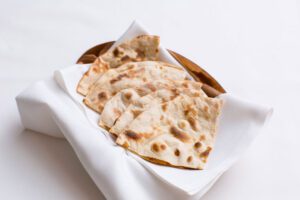
Tandoori Roti
Tandoori roti is a variation of roti that is baked in a tandoor — a traditional clay oven. The intense heat of the tandoor gives the roti its smoky flavor and slightly charred edges, making it a favorite in Indian restaurants.
Tandouri roti vs. regular roti
Cooking method: Tandoori roti is baked in a tandoor, while regular roti is baked in a pan.
Texture: Tandoori roti is slightly thicker and has a more rustic, chewy texture.
Taste: The tandoor provides a unique smoky flavor that regular roti lacks.

Naan
What is naan?
Naan is a soft, yeast-raised bread that is usually made with all-purpose flour, yogurt, and yeast or baking powder. Like tandoori roti, naan is traditionally baked in a tandoor, which gives it a flaky texture and charred spots.
Naan Variations
Plain Naan: A simple, quick bread that is perfect for scooping up curries.
Butter Naan: Brushed with melted butter for extra flavor.
Garlic Naan: Brushed with minced garlic and herbs.
Stuffed Naan: Filled with ingredients like cheese, paneer, or spiced potatoes.
Best Served With
Naan is a great accompaniment to creamy curries like butter chicken, chicken tikka masala, or palak paneer.
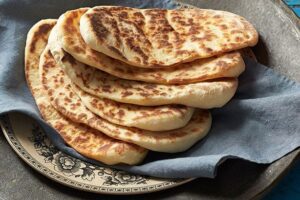
Roti vs Naan: Which to Choose?
Ingredients and Texture
Roti is made with whole wheat flour, while Naan uses all-purpose flour and is leavened.
Roti is lighter and healthier, while Naan is richer and more delicious.
Cooking Style
Roti is cooked in a tandoor or oven, while Naan is cooked only in an oven.
Pairing
Choose roti for everyday meals and light curries.
Opt for Naan with rich, flavorful gravy.
Roti Maker
For those who find it difficult to make roti manually, a roti maker (bread maker) is a handy kitchen appliance. It automates the rolling and cooking process, producing perfectly round loaves with minimal effort.
Advantages of a Roti Maker (bread maker)
Saves time and effort.
Uniform size and texture.
Ideal for busy households or beginners.

Pro tip
For best results, use freshly kneaded dough and preheat the roti maker (bread maker).
What to eat with naan bread?
Naan is a versatile bread that complements a variety of dishes. Here are some ideas:
Curries
Butter chicken
Paneer tikka masala
Lamb rogan josh
Lentils
Dal makhani (creamy black lentils)
Tadka dal (spicy yellow lentils)
Grilled meats
Tandoori chicken
Look for kebabs

Chutneys and dips
Mint chutney
Mango chutney
Raita
Desserts
Believe it or not, naan can also be used for sweet dishes! Spread a layer of Nutella or honey for a quick treat.
Conclusion
Indian breads like paratha, roti, and naan are more than just a side dish. They are essential elements of Indian cuisine that add depth and texture to every meal. Whether you prefer the flaky richness of paratha, the simplicity of roti, or the indulgence of naan, there is an Indian bread for every taste and occasion.
So, the next time you are planning an Indian feast, don’t forget to include these rotis — and enjoy them with your favorite curries, chutneys, or grilled dishes!
